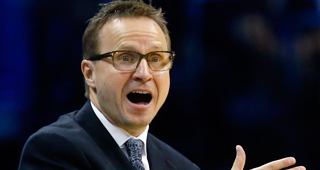After two seasons with series victories in the first round of the playoffs, the Washington Wizards fell back to a .500 record and missed the postseason in 15-16. Injuries contributed to the decline, especially a late season injury that knocked John Wall out of the final five games, but to expect a healthy season from this roster was unwise. Bradley Beal (27 missed games) and Nene (25 missed games) continued their trends of missing large portions of the season. Only backups Jared Dudley, Ramon Sessions and Garrett Temple were able to log 80+ games.
Looking to push past the second round, Randy Wittman promised last offseason that the Wizards would play a faster pace and would take more three pointers. Washington made good on that promise, improving their pace from 18th in the league in 2015 to fifth in 2016. They also made over 200 more threes (709 to 497).
Where things fell apart for Washington, aside from injuries, was on the defensive end. After back to back seasons as a top-10 defense, Washington dropped off to a middle of the pack team, coinciding with their middle of the pack record. The new system to push the ball and get up quicker shots fit personnel like Wall, Beal, and Otto Porter, but it wasn’t a great fit for many of the other Wizards. While moving to a faster pace may have been great for the offense and putting an exciting team on the floor, it definitely had a negative impact on the defense and the team’s record overall. And the failure to make the playoffs this year ultimately cost Wittman his job.
Moving into the offseason, the Wizards have already made their first big decision with the hiring of Scott Brooks to replace Wittman. There has been a lot of speculation that Brooks was hired to help lure Kevin Durant to Washington, but Washington and Brooks both deserve more credit than that. While Brooks could be a draw for Durant, he’s a good coach who did a great job building a young Oklahoma City team into a contender. While he’s been criticized for an unimaginative offense at times, it is also fair to point out that he had All-NBA talents in Durant and Russell Westbrook who often freelanced their way on the scoring end.
Even if Durant doesn’t sign, the Wizards still have a good coach with a solid track record of contention. But everything else Washington has done the last few seasons has pointed to this direction. So, why not double down on your Durant chances with your coaching hire?
The Wizards enter the offseason with only five players on guaranteed contracts, amongst the fewest in the league. The goal all along has been to build flexibility and space to be able to offer Durant a max contract. However, recent speculation is that Durant doesn't want to play in Washington. This leaves the Wizards in a bit of a tricky situation, but they should have more than enough cap space to fill out a competitive roster. Wall is entrenched at PG and Marcin Gortat is locked up at C. Markieff Morris, after being acquired at the deadline, showed he’s a capable PF for the future. Porter developed into a good player on both ends and can either be the SF, if Durant isn’t acquired, or a high level backup, if Durant does sign with the Wizards.
That leaves the question of Beal at SG. It had long been assumed that Beal was the long term answer at the 2 for Washington, but another injury plagued season as at least put some doubt in those plans. In addition, as detailed by Danny Leroux, Beal’s cap hold is now expected to be higher than originally assumed. This will eat in to space the Wizards might rather use elsewhere. It seems like a lock that Washington will extend a Qualifying Offer to Beal, as he’s still a terrific scorer and excellent shooter when healthy. With so much money available this summer, another team that is desperate for shooting could extend Beal a maximum offer and gamble that they can manage his injuries. This would put a crimp in Washington’s plans and force them to make a decision on breaking up their backcourt of the last four years, or committing major money to a player who has played more than 70 games one time in his career.
The Wizards other major decisions this summer revolve around veteran backups Dudley and Nene. Dudley enjoyed another productive season and as a player who can serviceably play the 2-4 positions while shooting around 40% from behind the arc, he’ll be sought after as a free agent. Several teams will likely go after Dudley summer, but Washington will need him to wait until Durant makes a decision to know how much money they can pay him.
As for Nene, he’ll be 34 when next season starts and he hasn’t played in as many as 70 games since the 2011 season. This past season the Wizards tried to keep him healthy by managing his minutes as a backup PF/C. His numbers predictably dropped off with the second fewest MPG of his career, but his efficiency was up. Regrettably, his health was not improved. At this point, with Gortat and Morris locked in at the big positions for the foreseeable future, unless Nene was willing to take a massive pay cut, it is probably time for the Wizards to move on.
The other free agents are a collection of backups and journeymen. Washington will have to renounce all of them to have enough space to make an offer to Durant, and very few of them are likely to be back. Players like Sessions and Temple could return as backups, but it would be after the initial waves of free agency are complete. In addition, also related to creating cap space, the team seems likely to waive both Jarell Eddie and Drew Gooden, neither of whom holds value above a replacement level.
If Durant isn’t coming home to Washington, where do the Wizards turn next? It is easy to envision them making a run at a player like Al Horford, who they have experience with being in the same division as the Hawks. Horford would fit nicely in a three big rotation with Gortat and Morris. Horford is likely to decide in early hours of free agency, same as Durant, so Washington could have some difficulty pitching both players.
A high level backup PG is a necessity due to Wall’s own injury history. Players like Ty Lawson or Brandon Jennings could be solid options, if they aren’t able to secure starting roles elsewhere. Getting a reliable backup SG is also important if Beal returns. Arron Afflalo, Eric Gordon, Gerald Henderson, or O.J. Mayo would all be nice options as players who can either play behind Beal or next to him in small lineups to spread the floor.
The Wizards having so few players under contract while chasing the biggest free agent target, puts Washington in a hard to read situation. They have to have backup plans in pace and to be ready to react immediately. The best situation may be to move off the Durant chase entirely and to pivot right away to other options. They have enough talent already under contract, that a few moves here and there and they can be right back in the playoff hunt. Trying to land Durant would make them contenders, but is a minor chance at a superstar worth sacrificing building a deep roster that could contend in the Eastern Conference? That is the question that Ernie Grunfeld needs to answer. He’s spent a few years building towards this summer and if it doesn’t go well, it might be the last one he gets in Washington.
Offseason Details
Guaranteed Contracts (5): Marcin Gortat, Markieff Morris, Kelly Oubre Jr., Otto Porter, John Wall
Partial/Non-Guaranteed Contracts (2): Jarell Eddie, Drew Gooden
Potential Free Agents (8): Alan Anderson (UFA), Bradley Beal (RFA), Jared Dudley (UFA), J.J. Hickson (UFA), Nene Hilario (UFA), Ramon Sessions (UFA), Garrett Temple (UFA), Marcus Thornton (UFA)
“Dead” Money on Cap (1): $833,334.00 (Martell Webster)
First Round Draft Picks (as of 4/25/16): None. Washington will keep their pick if it falls between 1-3 in the Draft Lottery.
Maximum Cap Space: $43,103,848
Projected Cap Space: $29,410,634



